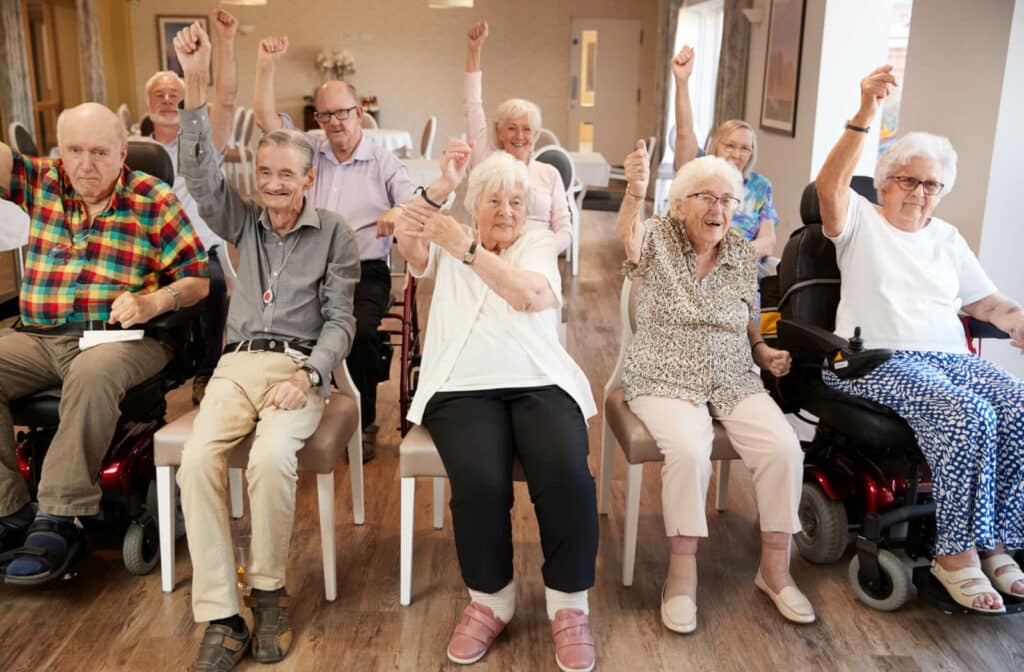It’s natural to experience a physical decline as the years pass. One of the most significant areas seniors struggle with is mobility. Watching a parent go through this regression can be challenging. However, understanding the causes of mobility loss can help you provide better care to support your parent’s safety.
Loss of mobility can result from many things, some that are out of your or your parent’s control. When your parent struggles to walk as they once could, you may need to alter their environment, get them walking aids, and encourage them to work on the mobility they have left.
If your parent is a resident of an assisted living community, they are surrounded by professionals and medical providers to help them manage their mobility and help with physical and occupational therapy. These communities are typically designed to be safe for them to maneuver and have systems in place for your peace of mind.
Causes of Mobility Problems in Older Adults
Arthritis
Arthritis is a common cause of mobility loss in seniors and can be debilitating. Arthritis is an inflammatory disease that causes severe pain and stiffness in the joints, making it difficult for a person to move around. There are many different types of arthritis, and each has its symptoms, but the most common include:
- Osteoarthritis: Most common in the hands, hips, and knees, some consider this type of arthritis as “wear and tear” of the joints as they begin to breakdown and alter the underlying bone
- Rheumatoid arthritis: This type of arthritis is an autoimmune and inflammatory disease causing painful inflammation and swelling, joint stiffness, chronic pain, balance problems, or misshapenness in the joints
Parkinson’s Disease
Parkinson’s disease is another common cause of mobility loss in seniors. Parkinson’s is a neurological disorder that affects the brain’s ability to control movements, resulting in symptoms including:
- Tremors in the hands, limbs, or head
- Muscle stiffness
- Slow movement
- Difficulty with balance and coordination
As the disease progresses, seniors can struggle to walk or perform everyday activities without assistance.
Stroke
A stroke occurs when the blood supply to the brain is cut off, and brain cells start to die. Sometimes, mobility loss occurs after a stroke, depending on which area of the brain is affected. If the stroke damages the part of the brain responsible for controlling movement, it could lead to mobility loss, including:
- Foot drop
- Weakness
- Spasticity
Muscle Weakness
Muscle weakness is a common problem in seniors due to sarcopenia, an age-related condition that decreases muscle mass and strength. When seniors have weakened muscles, it can be challenging to maintain their balance and perform daily activities like getting in and out of a chair or climbing stairs.
Fall-Related Injuries
Falls are one of the leading causes of mobility loss in seniors. When seniors fall, they risk suffering from significant injuries like broken bones or head injuries. These injuries can impact your loved one’s ability to move around and perform daily tasks, resulting in mobility loss.
How to Manage Mobility Loss
Modify the Home Environment
You can adjust your parent’s home environment to better suit their limited mobility. It’s advisable to arrange the essential areas of their suite, such as the bedroom, bathroom, and living room, so that your parent can easily access them.
As you tour assisted living communities, assess whether your loved one will need additional handrails, non-slip mats, or easy-to-reach fixtures to make the space easier to navigate. Make sure that everything in your parent’s space is in good condition and eliminate any tripping hazards.

Encourage Physical Activity
Even with limited mobility, it’s essential to encourage your parent to engage in physical activity. Their doctor or physical therapist may suggest activities such as gentle stretches or chair exercises. Physical activity can help improve blood circulation, reduce joint pain, and promote overall wellness.
Use Assisted Walking Devices
Assisted walking devices like canes, walkers, and wheelchairs are excellent options to support your parent’s mobility. These devices can help your parent move around independently and safely. However, ensure that your parent receives proper training on using these devices. With proper care, you can help your parent get the most out of their mobility device.
Tour Assisted Living at The Legacy at Forest Ridge
Watching a parent or loved one struggle with mobility loss can be challenging. You want your loved one to feel safe, comfortable, and cared for in their home environment. Assisted living is helpful when your loved one’s mobility declines and their care needs increase.
The Legacy at Forest Ridge has an experienced team of professionals who can customize your parent’s care to suit their mobility level. Our community areas are designed to accommodate residents and visitors with mobility issues, and our various floorplans are carefully designed to be secure, safe, and welcoming for your loved one.
Schedule a visit to the community, and we’ll create a care plan that addresses your loved one’s needs and concerns. With the proper support and care, your parent can continue to lead an active and fulfilling life.
